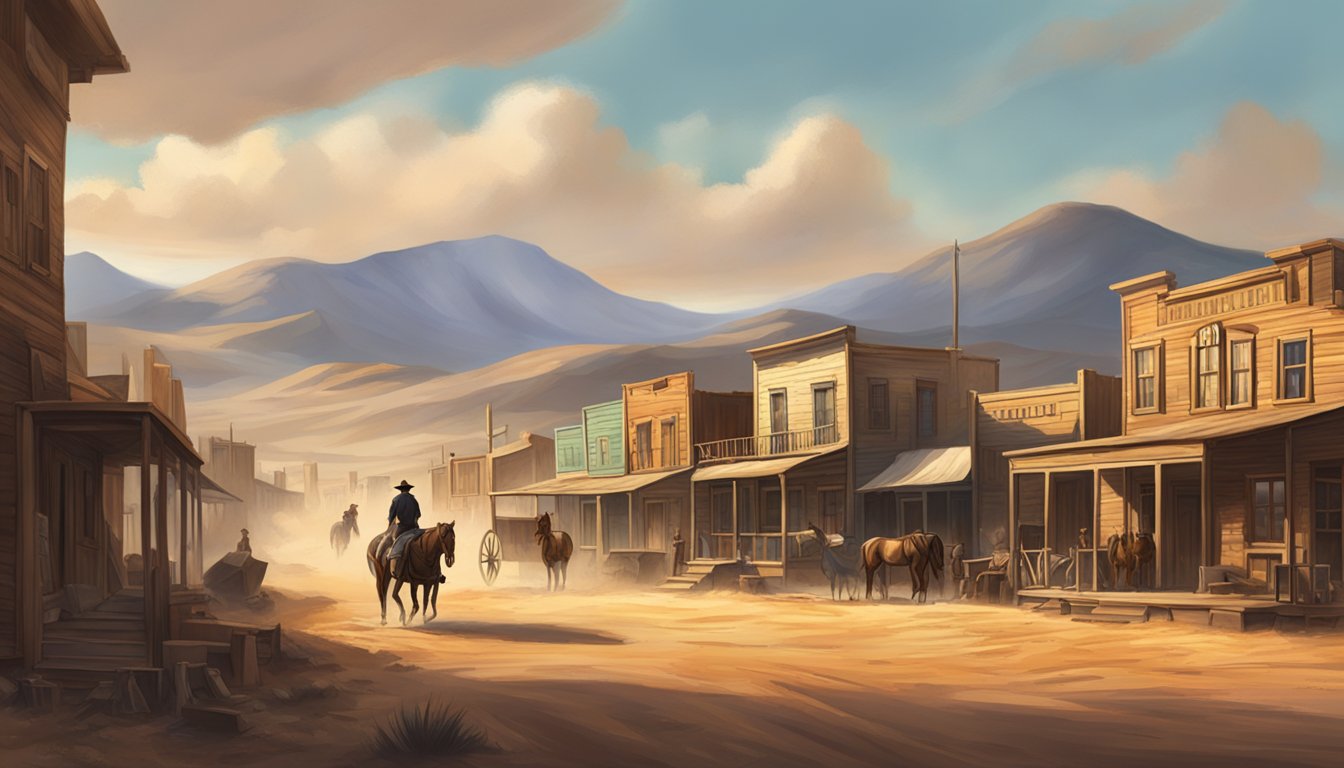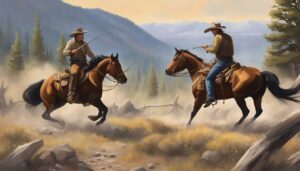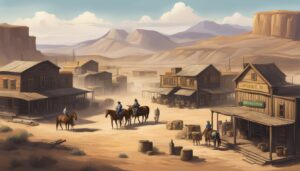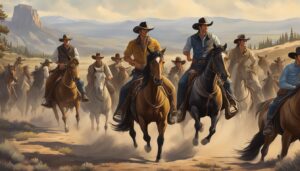TV westerns have captivated audiences for decades, with modern shows like Yellowstone and Godless bringing fresh perspectives to the genre. Both series offer compelling storytelling, complex characters, and stunning visuals of the American West.
While Yellowstone has garnered massive popularity, Godless stands out as the superior western drama in terms of narrative depth and authenticity. Godless, a limited series set in 1884, presents a unique take on the genre by focusing on a town predominantly populated by women. This feminist angle provides a fresh lens through which to explore traditional western themes.
Yellowstone, in contrast, offers a contemporary spin on the western, following the Dutton family’s struggles to maintain control of their vast Montana ranch. The show blends modern conflicts with classic western elements, appealing to a wide audience. Both series showcase strong performances and production values, but Godless edges out Yellowstone with its tighter storytelling and innovative approach to the genre.
The Evolution of the Western Drama
Western dramas have captivated audiences for decades, evolving from traditional frontier tales to complex modern narratives. This evolution is exemplified by shows like “Yellowstone” and “Godless”, which blend classic Western elements with contemporary storytelling.
Historical Significance of ‘Yellowstone’
“Yellowstone” marks a pivotal moment in Western drama, bridging the gap between classic and contemporary storytelling. Set in modern-day Montana, the show explores timeless Western themes of land ownership, family legacy, and power struggles.
It tackles current issues like Native American rights and corporate encroachment on rural lands. The Dutton family’s fight to maintain their ranch echoes the historical conflicts of the frontier era, providing a fresh perspective on the genre’s enduring appeal.
“Yellowstone” has reignited interest in Western dramas, proving that the genre can adapt to modern sensibilities while honoring its roots.
The Cultural Impact of ‘Godless’
“Godless” brought a unique perspective to the Western genre, focusing on a town primarily inhabited by women. This Netflix miniseries challenged traditional Western narratives by placing female characters at the forefront.
The show explored themes of gender roles, survival, and community in the Wild West. It garnered critical acclaim for its stunning visuals and compelling storytelling.
“Godless” demonstrated that Westerns could tackle complex social issues while maintaining the gritty atmosphere of the frontier. Its success paved the way for more diverse and inclusive Western narratives.
Comparing Storytelling Techniques
Both “Yellowstone” and “Godless” employ distinct storytelling techniques to bring their Western worlds to life. “Yellowstone” uses a sprawling, multi-generational narrative to explore the complexities of modern ranch life.
“Godless” opts for a more focused, limited-series format, allowing for tighter storytelling and character development. Both shows utilize stunning landscapes as integral parts of their narratives.
“Yellowstone” incorporates elements of family drama and political intrigue, while “Godless” leans into the lawlessness and isolation of the frontier. These techniques showcase the versatility of the Western genre in modern television.
Influence of Traditional Westerns on Neo-Westerns
Neo-Westerns like “Yellowstone” and “Godless” draw heavily from traditional Western tropes while adapting them for contemporary audiences. They maintain iconic elements such as vast landscapes, horseback riding, and gunfights.
However, these shows delve deeper into character psychology and societal issues. The influence of classic Westerns is evident in themes of justice, survival, and the clash between civilization and wilderness.
Neo-Westerns often incorporate historical events like the Civil War or the building of the transcontinental railroad as backstory. This blend of old and new keeps the Western genre relevant and engaging for modern viewers.
Casting and Character Development

Both “Yellowstone” and “Godless” feature stellar casts that bring their respective Western worlds to life. The actors in these shows deliver nuanced performances that elevate the storytelling and immerse viewers in the gritty realities of their settings.
‘Yellowstone’ Cast Ensemble
Kevin Costner leads “Yellowstone” as John Dutton, the patriarch of a powerful ranching family. His commanding presence anchors the show, supported by a talented ensemble including Luke Grimes, Kelly Reilly, and Wes Bentley as his children. Taylor Sheridan, the show’s creator, carefully crafted complex characters that evolve throughout the series.
The cast’s chemistry shines in tense family dynamics and power struggles. Notable performances include Cole Hauser as Rip Wheeler, the loyal ranch hand, and Gil Birmingham as Thomas Rainwater, the Native American casino owner.
‘Godless’ Cast Dynamics
“Godless” boasts an impressive cast led by Jeff Daniels as the ruthless outlaw Frank Griffin. Michelle Dockery sheds her “Downton Abbey” image to portray Alice Fletcher, a tough widow in the female-dominated town of La Belle. Jack O’Connell delivers a nuanced performance as Roy Goode, a man on the run from Griffin.
The show’s limited series format allows for focused character arcs. Merritt Wever stands out as Mary Agnes, the gun-toting former mayor’s widow who defies gender norms of the era.
Notable Performances in Western TV Shows
Sam Elliott’s portrayal of Shea Brennan in “1883,” the “Yellowstone” prequel, showcases his iconic Western presence. Tim McGraw and Faith Hill bring authenticity to their roles as James and Margaret Dutton, ancestors of the “Yellowstone” clan.
In “Deadwood,” Ian McShane’s Al Swearengen became a defining character of the genre. Timothy Olyphant’s portrayal of Deputy U.S. Marshal Raylan Givens in “Justified” blends modern sensibilities with classic Western archetypes.
These performances demonstrate the enduring appeal of Western characters when portrayed by skilled actors who can capture the complexity of life on the frontier.
Thematic Exploration and Societal Commentary

“Yellowstone” and “Godless” delve into complex social dynamics and power structures through distinct lenses. Both shows use the Western setting to examine timeless themes and contemporary issues.
Family and Power in ‘Yellowstone’
The Dutton family lies at the heart of “Yellowstone,” embodying the struggle for control and legacy. John Dutton, played by Kevin Costner, leads his clan with an iron fist, echoing patriarchal figures from classic Westerns and mob dramas like “The Sopranos.”
The show explores succession and inheritance, as John’s children vie for his approval and position. This family drama draws parallels to other acclaimed series like “Sons of Anarchy,” where bloodlines and business intertwine.
“Yellowstone” portrays the complexities of modern ranching, balancing tradition with progress. The Duttons’ conflicts with outside forces highlight issues of land rights, Native American relations, and corporate encroachment.
The Role of Women in ‘Godless’
“Godless” takes a different approach, placing women at the forefront of its narrative. The show centers on a town primarily populated by women after a mining disaster claims most of the men’s lives.
This unique premise allows for exploration of female strength and leadership in a traditionally male-dominated genre. Characters like Mary Agnes McNue challenge gender norms, adopting masculine attire and asserting their independence.
The series examines how women navigate power structures and defend their community against external threats. It offers a fresh perspective on frontier life, showcasing resilience and adaptability in the face of adversity.
Cultural Reflections and Realism
Both shows strive for authenticity in their portrayal of Western life, past and present. “Yellowstone” captures the rugged beauty of Montana, using on-location filming to immerse viewers in the landscape.
The series tackles contemporary issues facing ranchers and Native American communities, including land disputes and cultural preservation. It doesn’t shy away from depicting violence as a means of problem-solving, reflecting harsh realities.
“Godless” recreates the gritty atmosphere of the 1880s American West. It addresses themes of racial tension, religious fanaticism, and the impact of industrialization on frontier towns.
The show’s limited series format allows for a tightly crafted narrative that explores its characters’ backstories and motivations in depth.
Visual Style and Cinematography
Both Yellowstone and Godless showcase stunning visuals that elevate them beyond typical TV productions. Their cinematography captures the rugged beauty of the American West, immersing viewers in breathtaking landscapes.
The Scenic Landscapes of Montana and Wyoming
Yellowstone’s filming locations in Montana and Utah provide a spectacular backdrop. Sweeping vistas of vast prairies, towering mountains, and pristine rivers feature prominently. The show’s cinematographers skillfully frame these natural wonders, allowing the landscape to become a character in its own right.
Godless, set in New Mexico but filmed in Santa Fe County, also capitalizes on the region’s diverse terrain. The series portrays the harsh beauty of the Old West through wide-angle shots of dusty plains and craggy mesas. Both shows use natural light to great effect, capturing the golden hues of sunrise and the deep shadows of dusk.
Creative Direction and Imagery
Yellowstone employs a cinematic visual style more commonly associated with big-budget films. The show’s creative team utilizes sophisticated camera movements and framing techniques to enhance storytelling. Aerial shots provide a sense of scale, while intimate close-ups convey characters’ emotions.
Godless takes a grittier approach, with a muted color palette that reflects the harsh realities of frontier life. The series makes effective use of contrast, juxtaposing moments of violence with serene natural beauty. Both shows demonstrate meticulous attention to period-appropriate details in set design and costuming, further enhancing their visual authenticity.
Impact on Pop Culture and Spin-offs

“Yellowstone” and “Godless” have both left significant marks on television, revitalizing the Western genre for modern audiences. Their success has sparked a renewed interest in ranch life, Western aesthetics, and similar productions.
Influence on Modern Western Dramas
“Yellowstone” has become a cultural phenomenon, inspiring a new wave of Western-themed content. Its portrayal of the Dutton Ranch has captivated viewers, leading to increased interest in ranching lifestyles. The show’s success has prompted networks and streaming platforms to develop similar series.
“Outer Range” and “The Son” are examples of productions that followed in “Yellowstone’s” footsteps, exploring complex family dynamics in rural settings. These shows have contributed to a resurgence of the Western genre, appealing to both long-time fans and new audiences.
“Godless” also played a role in this revival, showcasing the potential for limited series in the Western format. Its critical acclaim demonstrated the enduring appeal of well-crafted frontier narratives.
Legacy Through ‘Yellowstone’ Spin-offs
The “Yellowstone” franchise has expanded its universe through multiple spin-offs. “1883” and “1923” delve into the Dutton family history, offering prequels that explore different eras of the American West. These series have attracted their own dedicated fan bases.
The announced “6666” spin-off promises to further expand the franchise, focusing on the legendary Four Sixes Ranch in Texas. These spin-offs have solidified “Yellowstone’s” place in pop culture, creating a multi-generational saga that appeals to diverse audiences.
The success of these spin-offs has influenced the television industry, demonstrating the potential for creating expansive universes within the Western genre. This approach has set a new standard for franchise development in television.
Critical Reception and Fan Base

“Yellowstone” and “Godless” have both garnered significant attention from critics and viewers alike. The shows have received praise for their compelling storytelling and performances, while also facing some criticism.
Audience Ratings and Reviews
“Yellowstone” boasts a dedicated fan base that has grown steadily since its debut. Viewers appreciate the show’s portrayal of modern Western life and the complex dynamics of the Dutton family. On review aggregator sites, “Yellowstone” consistently receives high audience scores.
“Godless” has earned praise for its unique take on the Western genre. Fans commend its strong female characters and stunning cinematography. The limited series format of “Godless” has allowed for a tightly crafted narrative that resonates with viewers.
Both shows have faced some criticism. Some reviewers find “Yellowstone” melodramatic at times, while others note pacing issues in early seasons. “Godless” has been critiqued for its slow start, though many argue the payoff is worth it.
Award Nominations and Wins
“Yellowstone” has received numerous award nominations, particularly for its performances. Kevin Costner earned a Golden Globe for his role as John Dutton. The show has also been recognized for its cinematography and production design.
“Godless” achieved critical acclaim during its run. It received 12 Emmy nominations and won three, including Outstanding Supporting Actor for Jeff Daniels. The series also garnered praise for its writing and direction.
Both shows have showcased talented ensemble casts. “The English,” starring Emily Blunt, has drawn comparisons to these series for its Western themes and strong performances. While not directly competing with “Yellowstone” or “Godless,” it demonstrates the ongoing appeal of Western-inspired entertainment.
Comparison of Series Finale and Legacy

The series finales of “Yellowstone” and “Godless” offer distinct conclusions to their Western narratives, shaping their lasting impacts on the genre. Both shows leave viewers with powerful final impressions, though they take different approaches in wrapping up their storylines.
‘Yellowstone’ Endings and Cliffhangers
“Yellowstone” concludes with John Dutton’s funeral, marking a pivotal moment for the Dutton family empire. This event serves as a catalyst for unresolved conflicts and power struggles among the remaining characters.
The finale intertwines the fates of key players in unexpected ways, leaving some storylines open-ended. This approach fuels speculation and discussion among fans about potential future developments.
The show’s legacy as a neo-Western drama is cemented by its exploration of modern ranching conflicts and family dynamics. Its impact on cable television ratings highlights the enduring appeal of Western-themed content.
Closure in ‘Godless’
“Godless” takes a different route with its finale, aiming for a more definitive conclusion to its limited series run. The show wraps up its main storylines, providing resolution to character arcs and central conflicts.
The finale of “Godless” emphasizes themes of justice and redemption, common in Western dramas. It offers a sense of closure to viewers, tying up loose ends and delivering on plot promises established throughout the series.
Unlike “Yellowstone’s” ongoing saga, “Godless” leaves a legacy as a self-contained Western narrative. Its focused storytelling and conclusion contribute to its reputation as a tightly crafted limited series within the genre.
Conclusion
Both Yellowstone and Godless offer compelling Western narratives for television audiences. Yellowstone has gained widespread popularity with its modern take on ranching conflicts and family drama. The show’s expansive scope and star power have contributed to its cultural impact.
Godless, as a limited series, delivers a tightly crafted story set in the 19th century Wild West. Its focus on a female-led town provides a fresh perspective on the genre. The show’s cinematography and performances have earned critical acclaim.
Ultimately, the “better” show comes down to individual viewer preferences. Those seeking an ongoing saga with contemporary themes may gravitate towards Yellowstone. Viewers interested in a self-contained historical Western with unique character dynamics might prefer Godless.
Both series demonstrate the enduring appeal of Western storytelling on television. They showcase how the genre can be adapted to different formats and time periods while maintaining core themes of frontier justice and rugged individualism.



